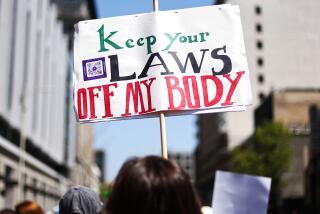The Open Doors
- Share via
Foes of the U.S. Supreme Court’s landmark decision legalizing abortion, who picked away at it with mixed results for more than a decade, have now launched a direct attack. The Justice Department is asking the Supreme Court to overturn its 1973 Roe vs. Wade decision. Even if the Supreme Court holds firm on that decision, as it should, the Justice Department’s political maneuver unfortunately puts the government on the side of those who do not realize that the same liberty that allows a woman to have an abortion is the liberty that allows another woman to decide against one.
The Justice Department brief reads well, expressing concern that constitutional adjudication on abortion has grown “like a picnic to which the framers bring the words and the judges the meaning.” The brief raises some of the reservations that thoughtful people have had about the Roe vs. Wade decision, especially the wish that the justices had not become entangled in trimesters of pregnancy in which abortion was permissible to greater or lesser degrees. Advances in medical technology over the last decade now threaten the logic of that framework.
In papers filed in challenges to Pennsylvania and Illinois laws, the department contends that Roe vs. Wade restricts even modest attempts to regulate abortions. That reading is wrong, both because many of the attempted regulations are far from modest and because over the years the court has upheld the constitutionality of a variety of regulations concerning abortion.
For example, in the very first abortion case that the Supreme Court heard after Roe vs. Wade, the justices upheld three aspects of a Missouri abortion law enacted in 1974. With regularity since then, states and cities have passed other restrictive laws--some based on genuine concern that abortions be performed in safe surroundings but most designed to complicate the process so that women cannot obtain abortions or will decide not to try.
The Roe vs. Wade decision has also not kept Congress from regularly passing restrictions on federal funds for abortions for poor women. The Justice Department is forgetting, or ignoring, the fact that the Supreme Court in 1980 upheld these restrictions on a 5-4 vote. In that case the court itself ignored the argument that a right that one cannot afford to exercise is a right effectively denied.
It is fundamental to remember that Roe vs. Wade did not create some new right of privacy, as the Justice Department implies. Roe vs. Wade built on earlier decisions going as far back as 1891 on the nature of an individual’s rights in a free society, including the right to make one’s own decision on child-bearing.
In a 1965 case in which the court struck down a Connecticut law outlawing use of contraception, Justice William O. Douglas wrote that the specific guarantees in the Bill of Rights had been construed as also providing certain peripheral guarantees, certain “zones of privacy “ in which the state could not interfere. Douglas added that in discussing contraception “we deal with a right of privacy older than the Bill of Rights--older than our political parties, older than our school system.”
Justice William J. Brennan Jr. added in the same case, “If the right of privacy means anything, it is the right of the individual, married or single, to be free from unwarranted governmental intrusion into matters so fundamentally affecting a person as the decision whether to bear or beget a child.” It is that right stemming from the 14th Amendment protections that specifically underlie Roe vs. Wade --not, as the Justice Department would have you believe, a set of vague, seemingly self-evident convictions that have no force in law.
The Jane Roe of this celebrated case was raped by three men on a back road, was unaided by law officers, and was denied an abortion by state law when she found that she was pregnant. Treated unsympathetically by doctors and too poor to travel to get an abortion, she finally found help from two young lawyers. They could not help her get her own abortion, but opened the doors for millions of women after her. Those doors are held open by legal principle, and must not be allowed to close.
More to Read
Get the L.A. Times Politics newsletter
Deeply reported insights into legislation, politics and policy from Sacramento, Washington and beyond. In your inbox twice per week.
You may occasionally receive promotional content from the Los Angeles Times.










